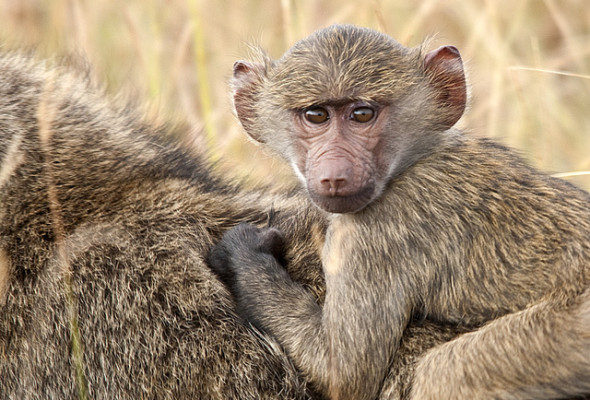Who are the animals that have most inspired people in 2013 to add their voices to the growing movement for animals? Leading up to the end of the year, AWP is celebrating the causes, campaigns and characters that have been at the forefront of helping make history for animals. Each day until the end of the year we’ll be focusing on another story. Please share far and wide.
Day 9: Wild Baboons
It will make sense to most people that if something is illegal in the UK, then taxpayer’s money should not be spent on sending UK researchers abroad to do exactly that illegal thing.
But some Newcastle University researchers did not agree. They travelled to a research institute in Kenya to perform invasive research on wild-caught baboons, something that has been effectively illegal in the UK since 1995 due to the distress caused by capturing and transporting the animals.
The British Union for the Abolition of Vivisection (BUAV) released video footage earlier this year showing appalling conditions for animals at the Institute of Primate Research in Kenya. In a bizarre interview with the Newcastle University student newspaper The Courier, the UK neuroscientist conducting his research there, Professor Stuart Baker, freely admitted the experiments wouldn’t be allowed in the UK but argued it was better to capture wild baboons who had lived for four or five years in the wild, rather then breed them in captivity.
In a timely twist of fate, the Brown Report into the awful treatment of animals at Imperial College’s animal testing laboratories was released at around the same time as the allegations against Professor Baker were brought to light. The Brown Report looked into the failures at Imperial College on ensuring the highest standards in vivisection. The spokesperson for the Brown Report, Paul Flecknell, is another professor at Newcastle.
Professor Flecknell said of the Brown Report’s findings that they were applicable to every university and institution conducting testing on animals.
“Every institution can find points in the report that should influence their operation,” said Professor Flecknell. “[At Newcastle] we will be discussing the report at our AWERB (ethics committee), at our Faculty/Central University Policy committee (that has oversight of our animal facilities), but more importantly I am consulting with both our technical staff and all our research workers to review how we operate, and how well we measure up to best practice.”
Although Professor Baker’s work in Kenya was not carried out under the control of the animal facilities in Newcastle, it was only a few days after the release of the Brown Report and the growing number of signatures on the BUAV petition that Newcastle announced it would be stopping Professor Baker’s visits to Kenya.
The wild baboons caught in Kenya for invasive experimentation have needs and a desire to live, as much as we do. After Professor Baker’s experiments, these social, intelligent creatures were killed. These free, wild primates—our closest nonhuman animal cousins—did not deserve to have their lives ended. The Animal Welfare Party is working to strengthen all current laws on animal research. We are against all harmful testing on animals, and want to see an immediate ban on the use of testing on primate species. Read our full manifesto, including our position on animals in laboratories.
Can you make 2014 an even safer place for primates kept in laboratories by becoming a visionary for animals? Support the Animal Welfare Party’s campaign in the EU Elections in May. If you live in London you can PLEDGE TO VOTE, and if you live anywhere and care about animals you can support us in our campaign to raise funds. Fundraising is crucial in our efforts to make history for animals. Make the difference now.
Image of baboon © Sergey Valiseev
(Author’s note: as a current student at Newcastle University in the humanities department, I was appalled by the findings of the BUAV’s investigation, as I have been concerned throughout by my time at Newcastle of their testing on animals. It is one of the reasons why I joined the Animal Welfare Party to contribute my support to achieving political representation for animals in the European Parliament.)







Leave a Reply